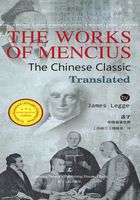
CHAPTER I
1. Mencius said, 'Opportunities of time vouchsafedby Heaven are not equal to advantages of situation afforded by the Earth, and advantages of situation afforded by the Earth are not equal to the union arisingfrom the accord of Men.
2. 'There is a city, with an inner wall of three lî in circumference, and an outer wall of seven.— The enemy surround and attack it, but they are not able to take it.


CHAPTER 1. NO ADVANTAGES WHICH A RULER CAN OBTAIN TO EXALT HIM OVER OTHERS ARE TO BE COMPARED WITH HIS GETTING THE HEARTS OF MEN.
Because of this chapter Mencius has got a place in China among the writers on the art of war, which surely he would not have wished to claim for himself,his design evidently being to supersede the necessity of war and the recourse to arms altogether.
1. In the 天, 地, 人, we have the doctrine of the 三才,or 'Three Powers', which is brought out so distinctly in the fourth part of the Chung Yung, and to show this in a translation requires it to be diffuse. As to what is said at much length in Chinese commentaries about ascertaining the 'time of Heaven' by divination and astrology, it is to be set aside, as foreign to the mind of Mencius in the text, though many examples of the resort to it may be adduced from the records of antiquity.
2. The city here supposed, with its double circle of fortification, is a small one, the better to illustrate the superiority of advantages of situation, just as the next is a large one, to bring out the still greater superiority of the union of men. As to the evidence that a city of the specified dimensions must be the capital of a baronial State (子男之城), see the 集证, in loc.


Now, to surround and attack it, there must have been vouchsafed to them by Heaven the opportunity of time, and in such case their not taking it is because opportunities of time vouchsafed by Heaven are not equal to advantages of situation afforded by the Earth.3. 'There is a city, whose walls are distinguished for their height, and whose moats are distinguished for their depth, where the arms of its defenders, offensive and defensive, are distinguished for their strength and sharpness, and the stores of rice and other grain are very large. Yet it is obliged to be given up and abandoned. This is because advantages of situation afforded by the Earth are not equal to the union arising from the accord of Men.
4. 'In accordance with these principles it is said, "A people is bounded in, not by the limits of dykes and borders; a State is secured, not by the strengths of mountains and rivers; the kingdom is overawed, not by the sharpness and strength of arms." He who finds the proper course has many to assist him. He who loses the proper course has few to assist him. When this,—the being assisted by few,— reaches its extreme point, his own relations revolt from the prince.


3. 非不, the repeated negation, not only affirms, but with emphasis:—城非不高, 'the wall is not but high',i.e. is high indeed. 兵,—sharp weapons of offence.草,—'leather', intending, principally, the buff-coat,but including all other armour of defence. 米,—'rice',without the husk; 粟,—'grain', generally in the husk.
4. 域, 'a boundary', 'a border', is used verbally.域民,—'to bound a people', i.e. to separate them from other States. 封 is 'a dyke', or 'mound'. The commentator 金仁山 says:—'Anciently, in every State, they made a dyke of earth to show its boundary封土为疆.' 溪,—'a valley with a stream in it'; here,in opposition to 山,=rivers or streams. The 道, or'proper course', intended is that style of government—benevolence and righteousness—which will secure the'union of men'.


When the being assisted by many reaches its highest point, the whole kingdom becomes obedient to theprince.
5. 'When one to whom the whole kingdom is prepared to be obedient, attacks those from whom their own relations revolt, what must be the result?Therefore, the true ruler will prefer not to fight; but if he do fight, he must overcome.'